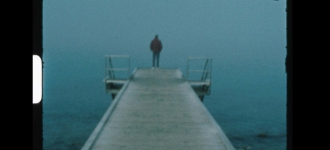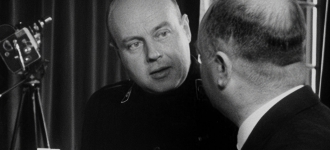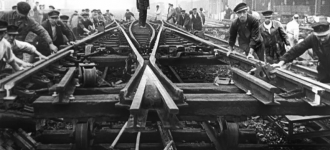Home movies, newsreels, non-commercial experiments, and unedited rushes; discovering these fragmentary traces of the past continues to trigger filmmakers’ fascination. Traditionally used to boost the authority of a cinematic narrative, film archives increasingly become the object of cinematic (meta)reflection and creative engagement. This year’s Viewfinder program offers not only a variety of themes and geographies, but showcases different ways of thinking with and about image archives. In the program, there are films reframing private memories and official propaganda, undertaking crafted montage experiments and cinematic archaeologies, or recovering layers of overlooked shared heritage.
Reconstructing different versions of the past, filmmakers are increasingly mindful of the potentialities and limits of archival labyrinths, both material and digital. Working with propaganda films, amateur recordings, and oral histories, Luuk Bouwman scrutinizes the life and career choices of Jan Teunissen, the infamous head of the Dutch Nazi Party’s Film Department, whose full control over the film industry earned him the “Film King” nickname and resulted in his postwar erasure from history (The Propagandist). While Bouwman searched for ways to bring together a multiplicity of sources, the lack of archival material creates a different type of challenge. It was taken on by Juanjo Pereira, who had altogether 120 hours of footage covering the 35 years of Alfredo Stroessner’s dictatorship in Paraguay. Striving to get beyond the official propaganda façade, Pereira’s Under the Flags, the Sun creatively interprets these fragments of official representation to explore how media shaped power and controlled memory.
Documentaries based on previously-unscreened footage or a corpus of overlooked experimental films allow to rechart history as we know it. The private archive of Vibeke Løkkeberg, a Norwegian filmmaker attending the First International Women’s Film Seminar, in Berlin, enables us to witness discussions of women filmmakers, honestly sharing their experiences of limitations and challenges they face in the male-dominated profession (The Long Road to the Director's Chair). Alternative film culture is unearthed by Matevž Jerman and Jurij Meden in Alpe-Adria Underground! that presents a broad panorama of Slovenian experimental cinema of the 1960–1970s. By digitizing 179 Avant-Garde shorts of all styles and genres, the film is a guide through a rich archive of Slovenian cinematic heritage.
Since the Lumières’ capture of a train arriving at La Ciotat station, the movement of trains and that of the camera have a special bond. Maciej Drygas’s montage takes us on a cinematic journey by using purely visual means. His film Trains paints a collective portrait of the 20th century, capturing the hopes, desires, dramas, and tragedies that defined the era.
Bringing all these films together into a dialog, this year’s Viewfinder offers a panoramic view of the last century’s struggles, discoveries, crimes, failures, and perseverance. Get on board for an exciting ride through the past—in the present.
Oksana Sarkisova
Viewfinder program curator




